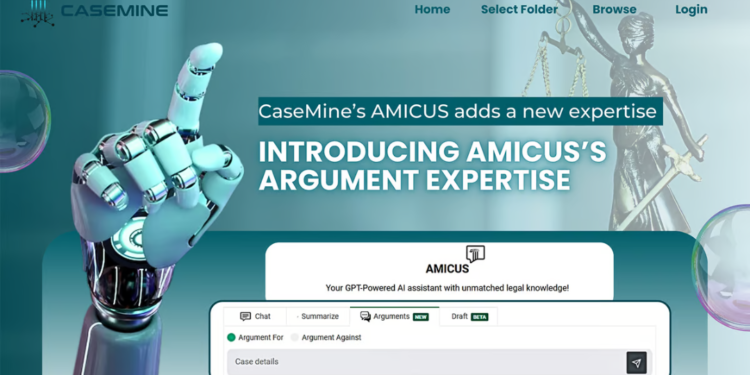CaseMine’s AMICUS, a state-of-the-art GPT-powered legal assistant, has been continuously evolving since its launch. In addition to its capabilities in conducting conversational research and summarizing legal documents, AMICUS has now advanced to include a powerful new feature: argument generation.
This feature is designed to assist legal professionals in crafting compelling arguments and counterarguments tailored to specific legal scenarios. By allowing users to input case details and client information, the Argument Generator produces comprehensive, citation-supported arguments, revolutionizing the preparation process for lawyers.
The Argument Generator significantly enhances the depth and variety of persuasive legal arguments available, giving users a distinct advantage in case preparation. It is an invaluable resource for lawyers preparing for court cases, offering reliable support in developing compelling narratives and strategies.
In legal proceedings, an attorney typically drafts a plaint or petition, presenting structured arguments and backing their claims with relevant statutes and case laws. To illustrate how CaseMine’s Argument Generator can assist in such scenarios, consider this example: “Jashu Pvt. Ltd., a small business, entered into a contract with a supplier named Ram to deliver raw materials by August 2, 2024. When Ram failed to deliver the materials on time, Jashu Pvt. Ltd. lost revenue and decided to sue Ram.”
Using the Argument Generator, the attorney representing Jashu Pvt. Ltd. can quickly compile a well-structured plaint supported by relevant statutes and case laws, ensuring a robust and persuasive argument in court.
In the case of Jashu vs. Ram, the Argument Generator would outline the legal obligations under the contract, cite specific statutes governing contractual obligations and breaches, and reference relevant case laws that set precedents in similar situations. This approach mirrors the methodical, evidence-based argumentation used in legal practice, ensuring that each claim is well-supported by legal authorities.
One of the key strengths of the Argument Generator is its ability to also generate counterarguments. This feature helps legal practitioners anticipate and address defenses that the opposing party might raise. For example, by using the “Argument Against” feature in the Jashu vs. Ram case, the model would outline potential defenses that Ram could use, supported by relevant statutes and case laws.
What sets AMICUS apart is its access to CaseMine’s unparalleled database of legal information. This extensive repository provides AMICUS with case laws and citations that are unmatched by other legal assistants. The arguments generated by AMICUS are not just theoretical constructs but are fortified with citations from actual cases that have been used by lawyers in similar situations. This level of specificity and reliability is unparalleled in the legal industry.
In conclusion, CaseMine’s AMICUS, with its latest Argument Generator feature, is setting a new standard for how legal professionals prepare for and engage in litigation. By leveraging GPT-powered technology and an extensive legal database, AMICUS offers a unique and unparalleled resource that enhances both the breadth and depth of legal arguments. Lawyers, regardless of their experience level, can now confidently draft, refine, and strengthen their arguments with citation-backed precedents, optimizing their strategies for court presentations.
Looking ahead, CaseMine has ambitious plans to further refine and expand AMICUS’s capabilities. Upcoming updates are expected to include advanced features for automated legal document drafting, streamlining the preparation of pleadings, briefs, contracts, and other essential legal documents. As AMICUS continues to integrate more sophisticated functionalities, it is positioning itself as the go-to generative AI tool for legal professionals, transforming the way legal research, argument generation, and document drafting are conducted.

















